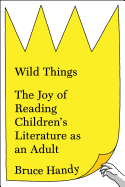
"It should go without saying that the best children's literature is every bit as rich and rewarding in its concerns, as honest and stylish in execution, as the best adult literature," Bruce Handy writes in the introduction to his debut, Wild Things. However, children's books, especially picture books, are often snubbed or dismissed by adult readers and critics, though they are "also as complicated, stubborn, contradictory, and mysterious" as any novel written with a grown-up audience in mind. In Wild Things, Handy, a veteran cultural critic and a longtime lover of children's literature, presents an intelligent, thoughtful and often funny critique-cum-defense of kid lit in general and a few classics in particular.
Beginning with Goodnight Moon, he explores the cultural forces that shape these beloved stories and their large, underlying existential themes. Few critics would think to compare The Runaway Bunny with Portnoy's Complaint, but Handy gets away with it--partly because of his obvious delight in the former, which he calls "as incisive a treatise on the parent-child bond" as Philip Roth's novel. Chapters are arranged in a rough chronology, from very early picture books to a few stories for older children, such as Laura Ingalls Wilder's Little House series and E.B. White's masterpiece Charlotte's Web.
Throughout Wild Things, Handy draws on attachment theory, environmental concerns, religious questions, the teaching of literacy and other big, "grown-up" ideas. But the true joy lies in Handy's love for children's lit and his unabashed insistence that it holds treasures for even the most cynical of grown-ups. Like the books it champions, Handy's is surprising, wise, highly entertaining and thoroughly satisfying. --Katie Noah Gibson, blogger at Cakes, Tea and Dreams

